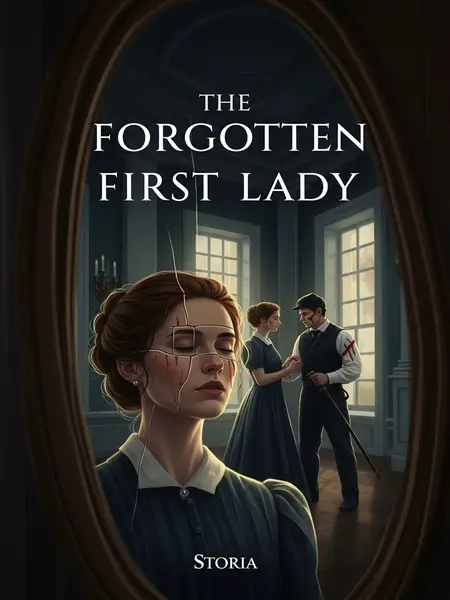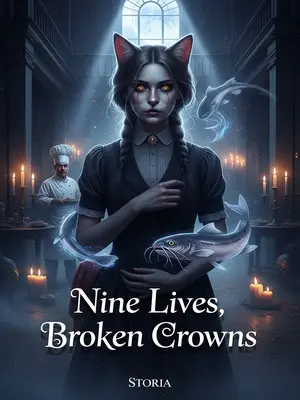Chapter 2: The Broken Attendant
Bruises bloomed across his skin like storm clouds gathering before a summer squall—purple, blue, yellow, fading but never gone. I’d catch glimpses of them when he changed clothes or rolled up his sleeves to wash the dishes. Some were old, others fresh, and all of them told a story I couldn’t quite piece together. The staff pretended not to see, but I saw everything.
A debauched servant, I thought.
I told myself he must have been reckless, careless with his own body. Maybe he’d gotten into fights or taken up with the wrong crowd. It was easier to believe that than to face the truth—that someone in this house was hurting him. I tried not to think about it, but the thought lingered, sour and persistent, gnawing at the edges of my conscience.
Miles served me with meticulous care and attention.
Despite his injuries, he was always there when I needed him—quiet, efficient, never complaining. He anticipated my needs before I even voiced them, bringing me tea when I was cold, blankets when I was tired. He moved through the house like a shadow, always watching, always waiting. Sometimes I wondered if he ever slept at all, or if he haunted these halls like I did.
But I disliked him, and often made things difficult for him.
I took out my frustration on him, snapping when he was slow or clumsy. I’d send him on pointless errands, just to see how far he’d go before breaking. He never protested, never fought back—just bowed his head and took it. The other staff watched, smirking, but I felt no satisfaction in their approval. Sometimes, I’d catch myself in the mirror afterward, cheeks flushed with regret, wondering why I needed to be cruel.
He never showed the slightest dissatisfaction, obedient as a dog.
No matter how I treated him, he remained unfailingly polite, his eyes dull and empty. He followed orders without question, never once showing a flicker of resentment. It was as if he’d been trained to accept whatever came his way, no matter how cruel. I found it unsettling, even frightening, and sometimes I’d lie awake at night, haunted by the image of his blank stare.
Harrison, however, took pride in him.
He’d boast about Miles’s loyalty at dinner parties, telling stories of his devotion to anyone who would listen. “He’d lay down his life for me,” Harrison would say, clapping Miles on the back with a heavy hand. The guests would laugh, raising their glasses in toast, while Miles stood silently in the corner, eyes fixed on the floor. I’d watch, a knot of unease growing in my stomach.
Even when sharing my bed, he would have Miles attend at the bedside.
It was a strange arrangement, one that made me deeply uncomfortable. I tried to rationalize it—maybe it was for my safety, or perhaps it was just another of Harrison’s power plays. Miles would stand at the foot of the bed, hands clasped, eyes averted, while Harrison and I lay together. I could feel his presence, heavy and awkward, like a ghost haunting the room. Sometimes I’d catch him trembling, his breath coming in short, ragged gasps, and I’d squeeze my eyes shut, wishing I could disappear.
Harrison knew I was shy.
He’d tease me, running his fingers through my hair, whispering that I should relax. “What are you so shy about? Think of this as a reward for him.” His words made my skin crawl, but I forced a smile, not wanting to give him the satisfaction of seeing me squirm. Inside, my heart would race, my stomach knotting with shame and anger.
“What are you so shy about? Think of this as a reward for him.”
Separated by the gauzy bed curtain, I couldn’t see Miles clearly.
But I could sense him trembling.
Was it shyness, fear, or anger?
I lay awake for hours, listening to the sound of his breathing, trying to guess what he was feeling. Was he ashamed? Afraid? Angry? I’d never know—he couldn’t tell me, and I was too afraid to ask. The silence stretched between us, thick and suffocating, until I finally drifted off to sleep, the questions swirling in my mind.
The Whitmore mansion was vast, but there were few staff, each more disciplined than the last.
The house was a labyrinth of polished wood and gleaming brass, every room echoing with the ghosts of old money and the grandeur of Colonial Revival architecture. The staff moved like clockwork, their uniforms crisp, their faces impassive. There were rules for everything—how to set the table, how to answer the phone, how to greet the governor’s guests. I felt like an outsider in my own home, always one misstep away from disaster, my every move shadowed by portraits of ancestors and the soft glow of a Tiffany lamp in the foyer.
Most of my amusement came from my attendant, Miles.
He was a source of endless fascination—a puzzle I couldn’t solve. I’d watch him from the window as he tended the garden, his movements slow but precise. Sometimes I’d catch him feeding the birds, his face softening as he watched them peck at the crumbs. There was a gentleness to him that didn’t fit with the rest of the house, a warmth that reminded me of the comfort of a favorite old quilt.
Miles was the most good-natured person I had ever met.
He never complained, no matter how much I pushed him. Even when I was cruel, he’d respond with a small, sad smile, as if he understood something I didn’t. The other staff mocked him, calling him simple, but I saw a quiet strength in the way he endured their taunts, his patience unwavering.
One day, he found a sick sparrow and cared for it for several days.
He built a little nest out of scraps of cloth, feeding the bird with an eyedropper and cradling it in his hands. I watched from the window, noticing the tiny bird’s heartbeat fluttering against his palm, the warmth of his touch a stark contrast to the chill in the rest of the mansion. For a moment, I almost envied the sparrow—safe in his hands, cared for, loved.
I was greedy, and while he was away, I roasted it and ate it.
I don’t know what came over me—maybe boredom, maybe spite, maybe just hunger for something real. I plucked the bird, roasted it over the kitchen fire like it was a chicken leg from my childhood, and ate it in two bites. When Miles returned and saw the empty nest, his face crumpled in disappointment. I felt a pang of guilt, but pushed it aside, telling myself it was just a bird, just another meal.
When Miles saw the feathers scattered on the ground, he was clearly upset, but still bowed and brought me tea.
He didn’t say a word, just gathered up the feathers with shaking hands and disposed of them quietly. Then he returned to my side, offering me a cup of tea—Earl Grey, the steam curling between us. I watched him, searching for a flicker of anger or resentment, but found only sadness. For the first time, I wondered if I’d gone too far, if I’d become the villain in my own story. I thought about apologizing, but the words stuck in my throat.
There was a period when Harrison was busy. After being intimate with me, he would return to his study to review paperwork.
He’d kiss me goodnight, then disappear into his office, leaving me alone in the vast, empty bedroom. The house would fall silent, the only sound the ticking of the grandfather clock in the hallway, mingled with the drone of cicadas outside the window. I’d lie awake, staring at the ceiling, counting the hours until dawn, the loneliness settling over me like a heavy quilt.
I was so exhausted that I would always ask the limping Miles to carry me to the bathroom.
He’d appear at my bedside, his eyes heavy with sleep, and lift me gently in his arms. His grip was unsteady, but he never dropped me. Sometimes I’d rest my head on his shoulder, breathing in the scent of Ivory soap and the faint tang of sweat. It was the closest I ever felt to being truly cared for, a fleeting warmth in the coldness of the house.
He would pant with the effort, but never put me down, always careful not to let me fall.
His breath would come in short, ragged gasps, sweat beading on his forehead. Still, he’d hold me tight, his arms trembling with the strain. I’d tease him, calling him weak, but inside I was grateful for his care. It was a small comfort in a house full of strangers, a quiet act of devotion that I never acknowledged aloud.
Come to think of it, I spent more time with Miles than with Harrison.
The realization struck me one afternoon as I watched Miles sweep the porch, the smell of cut grass drifting in from the yard. I knew the rhythm of his footsteps, the way he hummed under his breath, the shape of his smile. Harrison was a constant presence, but it was Miles who filled the quiet spaces of my life, who made the silence bearable.
Looking back, I realized I had grown rather fond of Miles.
It crept up on me slowly, like the first green shoots of spring after a long winter. I found myself seeking him out, inventing reasons to keep him close. His silence became a comfort, his loyalty a balm. I didn’t understand it, not then, but I felt safer with him than with anyone else.
A few times, I told jokes to Miles, making myself laugh so hard my sides ached.
He’d watch me, his eyes crinkling at the corners, a faint smile tugging at his lips. Sometimes he’d try to laugh, a soft, breathy sound that made my heart ache. I’d tease him, calling him a tough audience, but secretly I cherished those moments of shared joy, the flicker of connection between us.
But Harrison saw this. He never scolded me, but would always smile and summon Miles away.
His eyes would narrow, his smile turning cold. “Miles, come here,” he’d say, his voice sharp as a whip. Miles would obey, head bowed, and disappear into the shadows. I’d watch him go, a knot of worry tightening in my chest, the laughter dying on my lips.













